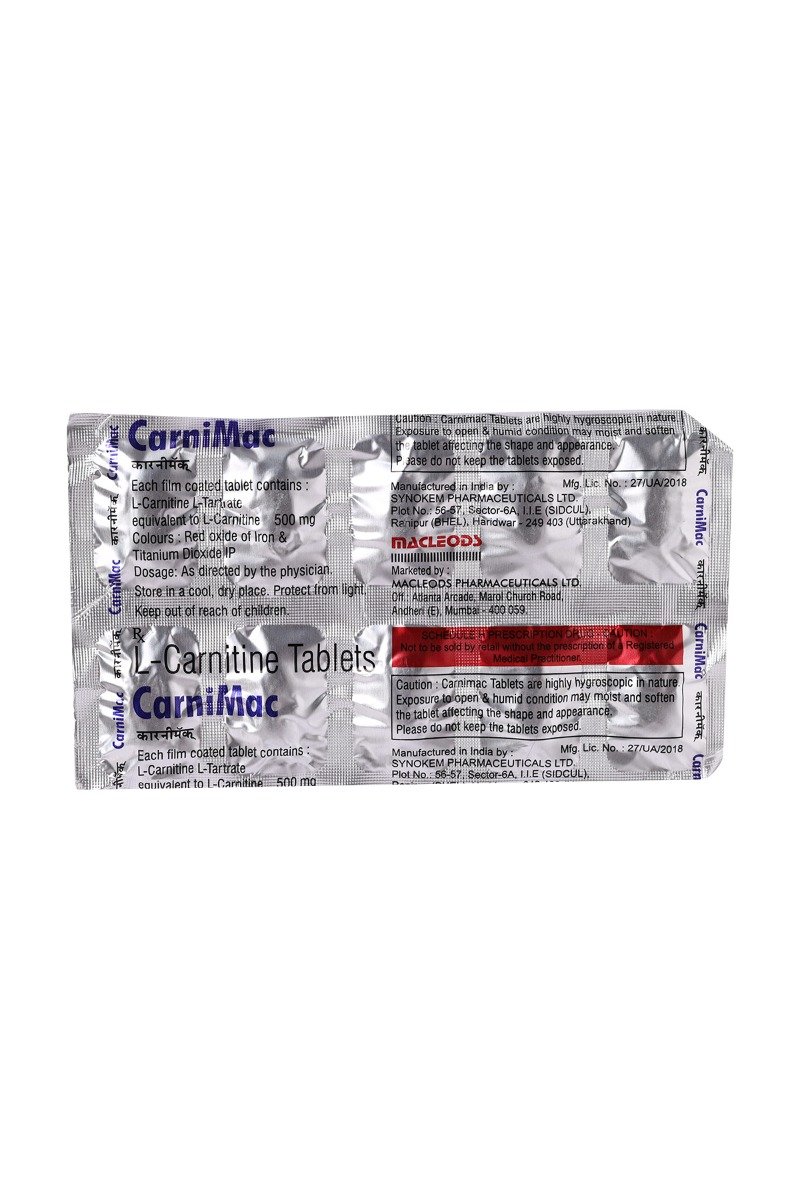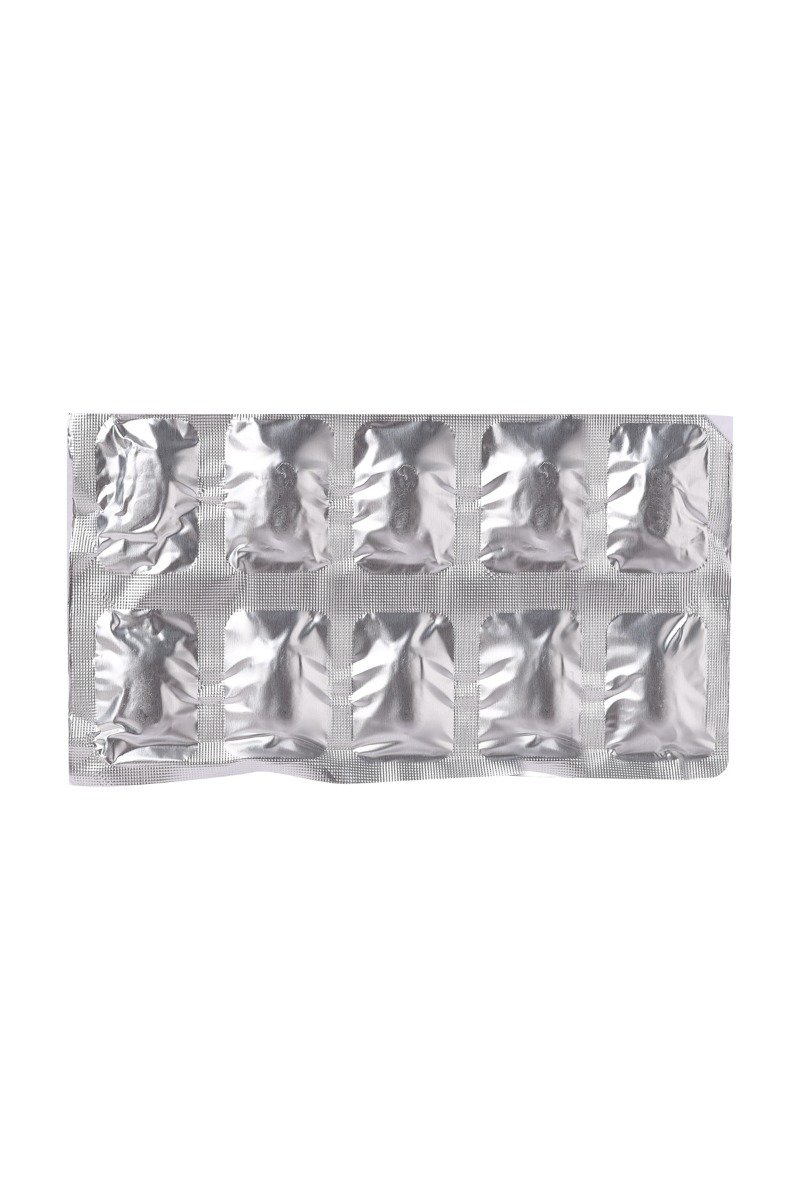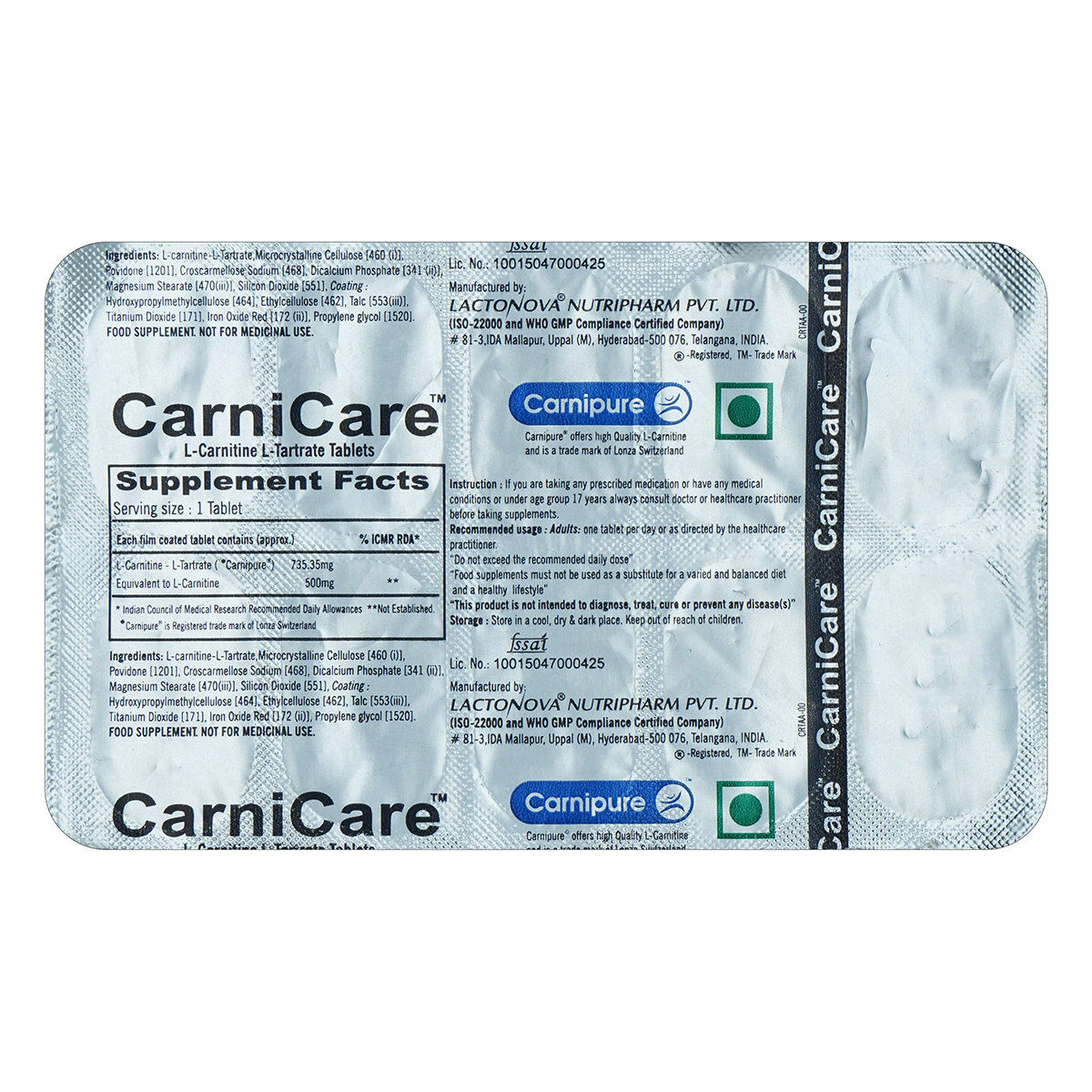Carnimac Tablet


MRP ₹242
(Inclusive of all Taxes)
₹36.3 Cashback (15%)
know your delivery time
Provide Delivery Location
Composition :
Manufacturer/Marketer :
Consume Type :
Expires on or after :
Return Policy :

Secure Payment

Trusted by 8 Crore Indians

Genuine Products
Therapeutic Class
Country of origin
Manufacturer/Marketer address
Author Details
We provide you with authentic, trustworthy and relevant information
FAQs
Disclaimer
Alcohol
Safe if prescribed
It is advised to limit the alcohol intake while using Carnimac Tablet .
Pregnancy
Consult your doctor
Carnimac Tablet should be used only when recommended by your doctor during pregnancy. Let your doctor know if you are pregnant or planning to conceive before taking Carnimac Tablet .
Breast Feeding
Consult your doctor
It is not known if Carnimac Tablet is excreted into breast milk. Please consult your doctor before taking Carnimac Tablet if you are breastfeeding.
Driving
Safe if prescribed
No interaction found/established.
Liver
Consult your doctor
Let your doctor know if you have any history of liver diseases before taking Carnimac Tablet . Dose adjustment may be required.
Kidney
Consult your doctor
Let your doctor know if you have any history of kidney diseases before taking Carnimac Tablet . Dose adjustment may be required.
Children
Safe if prescribed
Carnimac Tablet is not recommended for children below 12 years of age.
Product Substitutes
About Carnimac Tablet
Carnimac Tablet belongs to the class of 'nutraceutical products', primarily used to treat carnitine deficiency. Carnitine deficiency is a metabolic muscle disease caused by low levels of carnitine. Carnitine is an amino acid that helps in the production of energy from fatty acids. Symptoms of carnitine deficiency include weakness in the muscles of hips, shoulders, upper arms and legs, low blood sugar, fatigue, vomiting, abdominal pain, growth retardation and low weight.
Carnimac Tablet contains L-Carnitine or Levo-carnitine, a naturally occurring derivative of the amino acids, lysine and methionine. When taken as a supplement, the body converts L-Carnitine into acetyl-L-carnitine and propionyl-L-carnitine. These products further help the body to produce energy from fat.
Your doctor will decide the dosage based on your medical condition. Sometimes, Carnimac Tablet may have common side effects like stomach pain, nausea, vomiting, and diarrhoea. These side effects do not require medical attention and gradually resolve over time. However, if these side effects persist for a longer time, please seek medical advice.
Let your doctor know if you are using prescription, non-prescription drugs and herbal products before starting Carnimac Tablet . If you are known to be allergic to Carnimac Tablet or its inactive components, please inform your doctor. Please tell your doctor if you have an underactive thyroid (hypothyroidism), liver or kidney diseases, diabetes, fits, and dialysis treatment. If you are a pregnant or breastfeeding mother, please consult your doctor before taking Carnimac Tablet . Carnimac Tablet is not recommended for children under 12 years of age.
Uses of Carnimac Tablet
Medicinal Benefits Mweb
Key Benefits
Carnimac Tablet is used to treat primary and secondary carnitine deficiency. It contains L-Carnitine or Levo-carnitine, a naturally occurring derivative obtained from amino acids, lysine and methionine. When the body lacks the carnitine, Carnimac Tablet helps in replacing those low levels. Carnimac Tablet is further converted into acetyl-L-carnitine and propionyl-L-carnitine in the body. These products further help the body to produce energy from fat. Carnimac Tablet also plays a role as a water-soluble vitamin, antilipemic drug (lowers blood cholesterol), and a nootropic agent (improve cognitive function).
Directions for Use
Side Effects of Carnimac Tablet
- Stomach pain
- Nausea
- Vomiting
- Diarrhoea
Drug Warnings
Let your doctor know if you are using prescription, non-prescription drugs, and herbal products before starting Carnimac Tablet . Inform your doctor if you are allergic to Carnimac Tablet or its inactive components. Please inform your doctor if you have underactive thyroid (hypothyroidism), liver or kidney diseases, diabetes, and fits. Inform your doctor if you need to undergo dialysis treatment before starting Carnimac Tablet . Pregnant or breastfeeding women should consult their doctor before taking Carnimac Tablet . Keep Carnimac Tablet away from direct sunlight. Do not store Carnimac Tablet above 25°C and keep it away from direct sunlight.
Drug-Drug Interactions
Drug-Drug Interactions
Login/Sign Up
Drug-Food Interactions
Drug-Food Interactions
Login/Sign Up
Drug-Diseases Interactions
Drug-Diseases Interactions
Login/Sign Up
Drug-Drug Interactions Checker List
- WARFARIN
- ACENOCOUMAROL
Habit Forming
Special Advise
Let your doctor and the laboratory staff know if you are using Carnimac Tablet since it may interfere with laboratory tests.
Diet & Lifestyle Advise
- Try food sources like milk, cheese, eggs, liver and kidney, chicken, red meat, tuna, mackerel, and salmon, shellfish, oysters, clams, dark green vegetables, such as spinach and kale, beets, avocados, and potatoes, whole grains, cereals, kidney beans, black beans, and chickpea.
- Include fruits like citrus, banana, and watermelon in your diet.
- Avoid smoking and alcohol consumption.
- Exercise regularly and maintain a healthy lifestyle.
- Avoid excess fatty foods.
All Substitutes & Brand Comparisons
RX
Out of StockCarnivit 500 mg Tablet 10's
Sun Pharmaceutical Industries Ltd
₹146.5
(₹12.89 per unit)
40% CHEAPERRX
Out of StockCarnicare Tablet 10's
Lactonova Nutripharm Pvt Ltd
₹210
(₹18.9 per unit)
13% CHEAPERRX
Out of StockCarniglow Tablet 10's
Owshadh Pharmaceuticals
₹220
(₹19.8 per unit)
9% CHEAPER

Have a query?
Buy best Health & Nutrition products by
Vlado Sky Enterprise Pvt Ltd
Abbott India Ltd
Sun Pharmaceutical Industries Ltd
Apollo Healthco Limited
Zydus Healthcare Ltd
Macleods Pharmaceuticals Ltd
West Coast Pharmaceuticals Pvt Ltd
Intas Pharmaceuticals Ltd
Mankind Pharma Pvt Ltd
Meyer Organics Pvt Ltd
Emcure Pharmaceuticals Ltd
Lupin Ltd
Alkem Laboratories Ltd
Nutritionalab Pvt Ltd
Eris Life Sciences Ltd
Akumentis Healthcare Ltd
British Biologicals
La Renon Healthcare Pvt Ltd
Cipla Ltd
Micro Labs Ltd
Zuventus Healthcare Ltd
Torrent Pharmaceuticals Ltd
Pharmed Ltd
Dr Reddy's Laboratories Ltd
Modi Mundipharma Pvt Ltd
Corona Remedies Pvt Ltd
Hindustan Unilever Ltd
Indchemie Health Specialities Pvt Ltd
Apex Laboratories Pvt Ltd
Koye Pharmaceuticals Pvt Ltd
Leeford Healthcare Ltd
Bioceutics Inc
East West Pharma India Pvt Ltd
Alniche Life Sciences Pvt Ltd
FDC Ltd
Alembic Pharmaceuticals Ltd
Aristo Pharmaceuticals Pvt Ltd
DR Johns Lab Pharma Pvt Ltd
Herbs Nutriproducts Pvt Ltd
Guardian Healthcare Services Pvt Ltd
Vasu Organics Pvt Ltd
Pulse Pharmaceuticals
Fourrts India Laboratories Pvt Ltd
TTK Healthcare Ltd
Raptakos Brett & Co Ltd
USV Pvt Ltd
Glanbia Performance Nutrition India Pvt Ltd
Morepen Laboratories Ltd
Innovcare Life Sciences Pvt Ltd
Linux Laboratories Pvt Ltd
Troikaa Pharmaceuticals Ltd
Cadila Pharmaceuticals Ltd
Bright Lifecare Pvt Ltd
Wockhardt Ltd
Sanofi India Ltd
Primus Remedies Pvt Ltd
Zydus Cadila
Kellogg India Pvt Ltd
Tablets India Ltd
Indoco Remedies Ltd
Medley Pharmaceuticals Ltd
Overseas Health Care Pvt Ltd
Procter & Gamble Health Ltd
Shri Balaji Overseas
Dabur India Ltd
Ordain Health Care Global Pvt Ltd
Systopic Laboratories Pvt Ltd
Ajanta Pharma Ltd
Daris Biocare
Health & Happiness (H&H) Trading India Pvt Ltd
Hexagon Nutrition Pvt Ltd
Nutricia International Pvt Ltd
Zee Laboratories Ltd
Aareen Healthcare Pvt Ltd
Aeronutrix Sports Products Pvt Ltd
Emami Ltd
Radicool Pharmaceuticals Pvt Ltd
Wanbury Ltd
Biovitamins Pvt Ltd
Cadila Healthcare Ltd
Esmatrix Life Sciences Pvt Ltd
Ipca Laboratories Ltd
Klm Laboratories Pvt Ltd
Lloyd Healthcare Pvt Ltd
Sain Medicaments Pvt Ltd
Septalyst Lifesciences Pvt Ltd
Tas Med India Pvt Ltd
Wallace Pharmaceuticals Pvt Ltd
Biorex Healthcare Pvt Ltd
Elbrit Life Sciences Pvt Ltd
Levin Life Sciences Pvt Ltd
Panacea Biotec Ltd
Adret Retail Pvt Ltd
Cipla Health Ltd
Delcure Life Sciences Ltd
Femura Pharmaceuticals Pvt Ltd
Gladstone Pharma India Pvt Ltd
GlaxoSmithKline Consumer Healthcare Ltd
Kepler Healthcare Pvt Ltd
Ronyd Healthcare Pvt Ltd
SPECIALITY SUPPLEMENT
CALCIUM
IRON
VITAMIN D
COLLAGEN
VITAMIN B12
VITAMIN C
FISH OIL OMEGA
VITAMIN B
MULTIVITAMIN
Adult Nutrition Drink
ZINC
SEXUAL HEALTH SUPPLEMENT
WHEY PROTEIN
Kids Nutrition Drink
VITAMIN B9
ENERGY DRINK
SPECIALITY NUTRITION DRINK
DRY FRUIT
HERBAL JUICE
VITAMIN E
Prebiotic & Probiotic
ORS
SUGAR SUBSTITUTE
WOMEN & MOTHER NUTRITION DRINK
Chyawanprash
MAGNESIUM
Protein Bar
BREAKFAST CEREAL
Protein Powder
BIOTIN
DIABETIC NUTRITION DRINK
Honey
WEIGHT LOSS
Fat Burner
PLANT PROTEIN POWDER
VITAMIN B1
Apple Cider Vinegar
MELATONIN
APPETITE STIMULANT
Meal Replacement
Peanut Butter
AMINO ACID
Flax seed Oil
INFUSION TEA
NUT & SEED
Ashwagandha
Instant Food
OATS
Olive Oil
Mass Gainer
Pre Workout
CURCUMIN
POTASSIUM
VITAMIN A
DISKETTE
L-Carnitine
Cod Liver Oil
CREATINE
MILLETS & CEREALS
VITAMIN B6
ARGININE
COENZYME Q10
Shilajit
Appetite Suppressant
Chromium
MILK THISTLE
Glutathione
VITAMIN B2
VITAMIN K
L-Glutamine
MORINGA
GARCINIA CAMBOGIA
GREEN TEA
SPIRULINA
ALPHA-LIPOIC ACID
GLUCOSAMINE
GOKSHURA
BCAA Protein Powder
GILOY
NEEM
SAFFRON
SELENIUM
TRIPHALA
Tulsi
VITAMIN B3
VITAMIN B5
Brahmi
CANDIES
FRUIT JUICE
Face Gel
Specialty Supplements
WEIGHT GAINER
WHEAT GRASS POWDER
Frequently Bought Together
Customers Also Bought









